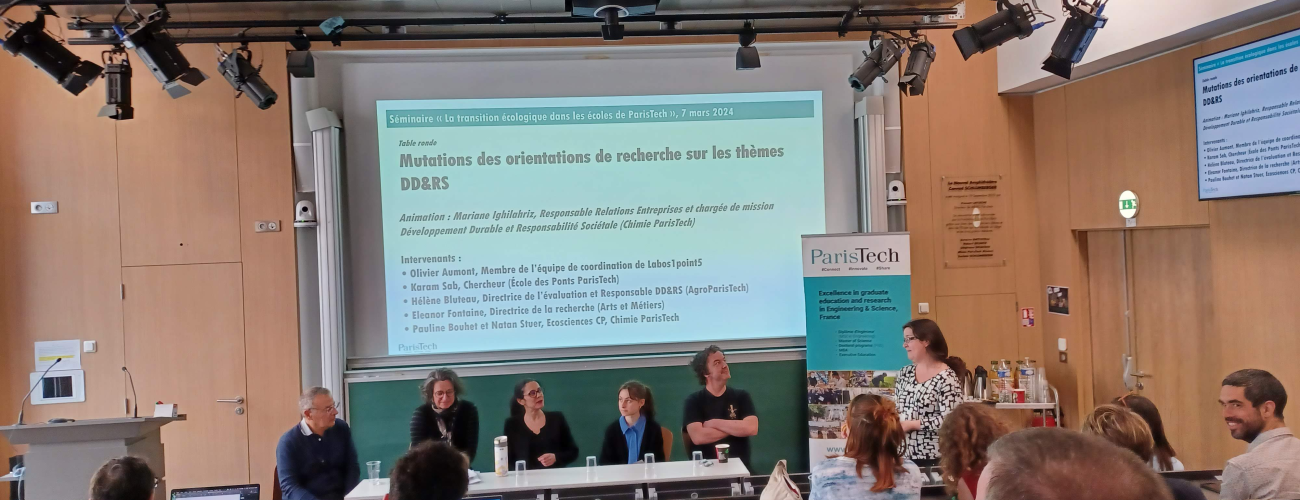
Séminaire Transition écologique, 2024
©ParisTech_Florence Lelait
ParisTech schools join forces to promote the ecological transition
Workshop, March 7, 2024
For several years now, the ecological transition has been at the heart of the schools' concerns. Indeed, it's not just a question of education, but also of research and, more broadly, of the global strategy and governance of the schools. The schools of the ParisTech network thus devoted an entire afternoon to exchanging best practices and discussing with outside experts how to move forward on these issues.
The seven schools in the ParisTech network met on March 7, 2024 in the Schlumberger amphitheater at the École des Mines de Paris, for the workshop "Ecological transition in ParisTech schools" organized by Marie-Ségolène Naudin-Gèze, ParisTech's delegate for education. Introduced by General Delegate Florence Lelait, who recalled the conclusions of the Court of account’s report on "The higher education towards the ecological transition", the workshop featured three round tables:
- Education and ecological transition, led by Emeric Fortin, Head of Master's programs and sustainable development at École des Ponts ParisTech;
- Changing research orientations on SD&SR themes, led by Mariane Ighilahriz, Head of Corporate Relations and Sustainable Development and Corporate Social Responsibility at Chimie ParisTech;
- Participative and mobilizing governance strategy, led by Marie-Ségolène Naudin-Gèze.
Each round table provided an opportunity to review the challenges and objectives surrounding these issues, and to discuss the practices implemented by the schools, the tools used (reference frameworks - DD&RS, manuel de la grande transition, GreenComp, etc.), and even the difficulties encountered, - measurement tools, etc.) and any difficulties encountered. For the first two round tables, the schools were pleased to welcome representatives of student associations, in this case INterfer for the Institut d'Optique and Écosciences for Chimie ParisTech. In particular, they stressed that while the schools do offer an awareness-raising program, it is important to go further in training engineering students and, beforehand, teachers, and to respond as effectively as possible to students' requests in this area. Faced with a student body that arrives at their school having often already been extensively sensitized, and thus expressing even higher expectations, most schools are still working on deploying a systemic approach to the subject throughout the engineering curriculum. This means training teachers, enriching training with a human and social sciences dimension, reformatting existing courses or even eliminating some to make way for new ones, and promoting the interdisciplinary approach favored by project-based work. It's a major project that the schools are tackling to meet this challenge, then, to meet these expectations and train engineers capable of thinking critically about the technological solutions proposed to combat global warming and other environmental damage. Guillaume Pakula (Projet Celsius) stressed that it was vital that this new emphasis on training had a real impact, and that students understood the role of the engineer in a world in transition towards energy and ecology.
While training is of course of prime importance in shaping tomorrow's engineers, the fact remains that the schools' researchers must also be aware of the impact of their research activities, and that the schools must also reduce their carbon footprint in this area. And beyond the carbon footprint, scientific integrity and gender were also mentioned as elements in the transformation of research. Olivier Aumont, representing the Labos 1Point5 association, welcomed the fact that the French Ministry of Higher Education and Research is now setting quantitative targets for reducing CO2 emissions, as this can have a real impact. He pointed out that in the field of research, the carbon footprint is mainly concentrated in three areas: infrastructure, purchasing and travel (conferences, seminars, juries, etc.), which raises the question of how and what type of research we want to do. Karam Sab, a researcher at École des Ponts ParisTech and former laboratory director in charge of foresight at CNRS ingénierie, reinforced the point by emphasizing that the approach must necessarily be collective.
Finally, even beyond education and research, it is important for the entire school community to get to grips with this subject, which the government's SD&SR plan should encourage them to do. While not all schools have set themselves the goal of obtaining the SD&SR label for the time being, they are all working hard to draw up an action plan and implement it. This is a strategic area of development for many schools. The challenge for school management is to succeed in mobilizing the entire community, bearing in mind that student turnover is itself naturally high, that administrative staff do not always feel concerned or legitimate, and that some teachers may be reluctant to change the way they teach. Various tactics have therefore been put in place to raise staff awareness and achieve the objectives: climate fresco, business approach (purchasing, human resources...), training, team-building activity around the ecological transition...
Ideas - and achievements - are already abundant in schools at all levels. Let's hope that this seminar has given everyone the ideas they need to move the process forward for the benefit of all!

